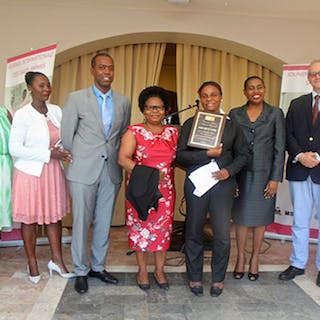
By Sarah Craven, Director, Washington Office of UNFPA, the United Nations Population Fund
A hurricane brings wind and rain. It can bring destruction and even death. But for one midwife in Haiti, a hurricane brought her life. Six lives, to be exact.
On October 4, 2016, category-4 Hurricane Matthew violently struck southwestern Haiti, creating the largest humanitarian crisis in the tiny nation since 2010.
Marie-Lirette Casimir, a midwife working for UNFPA, the UN Population Fund, was on duty at Saint-Antoine’s Hospital of Jeremie when the storm struck.
The storm gathered strength around midnight, with winds over 200 kilometers per hour ripping open parts of the roof. Torrential rain shattered windows, and the electricity supply was cut. Amid the rising water, Ms. Casimir stayed and risked her own life to help six women give birth safely by flashlight.
Ms. Casimir is one of the countless midwives trained by UNFPA, which is the lead UN agency working to ensure every pregnancy is wanted, every childbirth is safe, and every young person’s potential is fulfilled. UNFPA works with partners to strengthen health systems, including through the training of midwives, who – when properly trained – could avert two-thirds of maternal and neonatal deaths.
UNFPA’s work around the world contributes to achieving Sustainable Development Goals 3, 5, and 10 – ensuring a healthy and equitable world for women and girls. And in places like Haiti, UNFPA’s work is especially important. Pregnant women in Haiti faced daunting odds long before Hurricane Matthew struck. Haiti has the highest maternal and child death rates in the Western Hemisphere, with a rate of 359 deaths per 100,000 births in 2015.
UNFPA supports Haiti’s Ministry of Public Health and Population (MSPP) in the training and deployment of 2,200 midwives throughout the country to adequately meet the needs of the population. The National Institute for the Training of Midwives, of which UNFPA is the sole financial contributor, with the MSPP, trains about 100 professional midwives each year.
UNFPA’s presence on the ground before an emergency makes UNFPA uniquely equipped to assist when disaster strikes – and there’s no better person who embodies that than Marie-Lirette Casimir, who was trained and supported by UNFPA before Hurricane Matthew. Ms. Casimir’s sense of duty as a medical professional is nothing less than heroic and changed the lives of six women and their precious newborns forever.
Since the Hurricane struck, conditions have deteriorated sharply, with the complete destruction of many hospitals that women relied upon for vital reproductive health services. UNFPA has worked to rehabilitate maternity units damaged in the disaster and provide reproductive health kits with medicines and materials required to support safe childbirth, post-rape treatment, and other care to 390,000 people.
Additionally, UNFPA partnered with Johnson & Johnson and The Baby Box Co. to support 2,500 women and children with relief baby boxes. These baby boxes, which will be filled with materials for the mother and baby, will also serve as the baby’s first bed. This year, funds raised through the fifth annual Global Moms Relay will help provide health services for mothers and families impacted by Hurricane Matthew.
As a long-term strategy, UNFPA will focus on restoring the capacity of the overall health system to deliver quality services to reduce maternal and neonatal deaths.
As an American and mother of three working for UNFPA, there’s no greater joy than seeing the UN successfully partner with governments and the private sector in the U.S. to respond to those most in need.
This post is part of the “SDG Solutions” series hosted by the United Nations Foundation, Global Daily, and +SocialGood to raise awareness of ways the international community can advance, and is advancing, progress on the Sustainable Development Goals. As the international community prepares to gather at the UN for the High-Level Political Forum on Sustainable Development from July 10-19, this series will share ideas and examples of action. Previous posts in the series can be found here.

